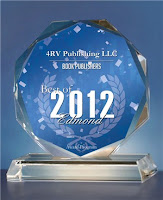
Anyone who has attended classes about writing or who has been in sessions at conferences or who has read books or magazines about writing came across the adage at least once: "To be a good writer, read, read, read, read."
I know what at least one reader thinks, "How can I learn anything if what I'm reading isn't worth reading?" Good question. However, reading bad writing can help a person become a better writer IF he realizes the writing isn't good. He can learn what or how not to write.
Now, back to reading helping people become better writers. When I took composition classes in college, I
often became frustrated with all the reading I had to do, story after
story after story, many times thousands of pages per assignment. Yet, as
we discussed the stories and what made them interesting, or what
didn’t, I was learning how to write. Even today, as I read and review
on Writing.Com and for NovelSpot, I learn more about what makes a good story and what
doesn’t. In fact every time I read someone else's work, I learn and share.
I used the reading, discussion, and then writing idea when I taught, too. I tried to highlight one or two concepts per story, then had the students write something using those concepts and any others we had already covered. First, however, came reading and reading and reading.
As I read the September, 2005, issue of The Writer, I discovered an article by Erika Dreifus titled “Learning short-story writing by example." She agrees with my university professors and me: “We learn by reading closely and reading as writers – attending to the ways others employ the elements of fiction: setting, plot, character, theme, and so on.”
So where can a person find short stories to study, ones that will help him or her learn correct story writing? Of course books of short stories are found in all book stores. In fact, Holly Jahangiri and I have a collection of short stories for sale on the 4RV Bookstore, Amazon, and through brick 'n mortar stores, Hidden Lies and Other Stories. Plus many bookstores connected to colleges have anthologies for sale. If someone couldn’t afford to buy a new anthology or collection, used bookstores or libraries carry them. Using the library's copy is free.
I used the reading, discussion, and then writing idea when I taught, too. I tried to highlight one or two concepts per story, then had the students write something using those concepts and any others we had already covered. First, however, came reading and reading and reading.
As I read the September, 2005, issue of The Writer, I discovered an article by Erika Dreifus titled “Learning short-story writing by example." She agrees with my university professors and me: “We learn by reading closely and reading as writers – attending to the ways others employ the elements of fiction: setting, plot, character, theme, and so on.”
So where can a person find short stories to study, ones that will help him or her learn correct story writing? Of course books of short stories are found in all book stores. In fact, Holly Jahangiri and I have a collection of short stories for sale on the 4RV Bookstore, Amazon, and through brick 'n mortar stores, Hidden Lies and Other Stories. Plus many bookstores connected to colleges have anthologies for sale. If someone couldn’t afford to buy a new anthology or collection, used bookstores or libraries carry them. Using the library's copy is free.
The best help found in reading to learn to write is to read well-written stories, and read, read, read. Reading well-written novels helps one to learn to write, too, for developing longer plots and sub-plots, for building consistency for longer works. As I stated above, reading even bad material gives ideas of how not to write.
Any writer who doesn't find time to read is hurting his writing craft and short-changing his readers.












